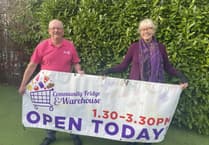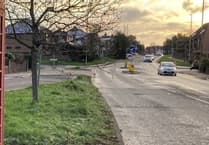DENNIS Stone, who devoted more than half a century of his life to The Herald series of newspapers first as a printing apprentice aged 14 and latterly managing director, has died at the age of 90.
Mr Stone, as everyone at The Herald knew him, was born in Bridge Square, Farnham, on August 5, 1926, the youngest son of parents Arthur and Beatrice who together ran the Express Dairy opposite the modern-day William Cobbett pub in Bridge Square.
He spent his early days helping out at the dairy, including tending two horses used to pull the milk floats, and attended St Andrew’s infants and West Street boys schools before joining the Farnham Herald on August 5, 1940 - his 14th birthday.
Mr Stone signed his apprenticeship indentures in The Herald printing works, “to make the tea and be a general dogsbody”. But within months, because of a wartime labour shortage, he was working a linotype machine while still pushing a hand-cart piled with Heralds to the railway station on Friday evenings.
This launched a long career in print; interrupted only in 1944, a year before the end of the war, when Mr Stone’s membership of the Farnham Sea Cadets led to enlistment into the Royal Navy aged 18.
He served for a number of years aboard the aircraft carrier HMS Indefatigable and, owing to his publishing background, was appointed a decoder tasked with translating coded messages into standard English.
Returning to The Herald in 1947 as a linotype operator, Mr Stone met his future wife Eileen Watts soon after at the Saturday dances held in the Memorial Hall, and the couple tied the knot on September 3, 1949, at St Andrew’s Parish Church where they remained staunch members of the congregation.
The couple’s first child, Keith, was born in 1956, followed by Robert in 1958; the same year they bought their ‘forever’ family home in Hazell Road. After the move, they also became devout members of the St Francis Church congregation, just off Crondall Lane.
Mr Stone was made composing room overseer at The Herald in 1952 and general manager in 1969, the latter following Sir Ray Tindle’s purchase of the newspaper from its founders the Langham/Meddows-Taylor family.
Referencing this period of his life in his retirement speech some years later, Mr Stone said: “My previously comparative normal life was shattered and each day has brought surprises and tests of endurance that few people have to cope with in a normal working life.”
In the proceeding years, ‘Superman Stone’, as Sir Ray would come to call him, ensured The Herald kept abreast of leading technologies, taking the paper into phototypesetting in the early 1970s and forward onto the Cossor press.
With the West Street site out-grown, a prestigious new site was also found for the press and composing; an occasion fondly recalled by The Herald’s former chief executive Tom McGowran.
“With immaculate timing Dennis organised that we move the press on the day this part of the south of England was hit by a hurricane,” said Mr McGowran speaking at his predecessor’s retirement dinner.
“Just as amazing was the fact that he had the press up and running in the new location within four days. Dennis is quite unflappable. Many times lesser mortals would have lost their cool, but Dennis just went on calmly getting things done.”
Mr Stone was later promoted to managing director of Farnham Castle Newspapers in 1980 and, in this role, frequently travelled the country, visiting the widespread provincial newspapers which became part of the Tindle group.
His final promotion came when, aged 65, he was appointed vice-chairman of The Herald and he retired in 1997, aged 71, after a marathon 56 years with the company.
Musing on the success of The Herald during his tenure, Mr Stone said on his retirement: “There are hundreds of local papers over the country, but few have kept their identity and image like those in this group.
“The town and district could not do without the Farnham Herald series. I feel The Herald has never lost its local flavour and once a paper loses its identity it loses its readers.”
In addition to several gatherings and meals in his honour, The Herald marked Mr Stone’s retirement by reviving the age-old printing tradition of the ‘banging out’ parade.
According to the papers’ report of the occasion on Thursday, May 15, 1997: “Shoppers stopped and stared with open-mouthed wonder as a veteran car containing men in white pointed hats led a procession of more than 100 people banging tins, lids and trays along West Street.”
The tradition goes back to the days of hot metal printing when print apprentices, who had completed their several years of training, were officially freed from their contract and ‘banged out’. Subsequently it also became the method for marking the retirement of print workers who, like Mr Stone, were ‘banged out’ of the building.
Speaking at his retirement gathering in the old Cossor press room where Mr Stone had turned up for his first day of work in 1940, Sir Ray Tindle, chairman of Tindle Newspapers and proprietor of The Herald, spoke of Mr Stone as his “oldest friend and colleague in the newspaper industry”, having worked together for 28 years.
“We stood here and we planned the expansion of this one newspaper until it became, with your help, the group of family-owned newspapers it is today,” said Sir Ray.
“I am overawed,” said Mr Stone afterwards. “I didn’t realise that leaving my first job would create such a fuss!
“The years have been a challenge, but they were exciting times and I have enjoyed them immensely.”
During his professional career, Mr Stone also served as chairman of Country Graphics, a director of Surrey and Hants News and of the Tindle Enterprise Centres for the unemployed.
A keen swimmer throughout his life, he also served as president of the Farnham Swimming Club, was a founder member, alongside Sir Ray, of the Farnham Visitors Council, and was also heavily involved in the Farnham Music Festival.
In addition, he spent a time as publicity officer for Surrey of the Wishing Well Appeal and president of the Wessex Association of Newspaper Publishers.
Speaking on the occasion of his diamond wedding anniversary in 2009, Mr Stone paid tribute to his “wonderful wife” and said both he and Eileen have kept very busy with their many shared interests which include swimming and walking.
He died at Frimley Park Hospital in the early hours of last Friday (February 17) after a long spell of poor health, and is survived by his wife Eileen, two sons Keith and Robert and four grandchildren. His older brother Arthur, who was a well-known bowler in the town, died a few years ago.
The arrangements for Mr Stone’s funeral will be announced in due course.




